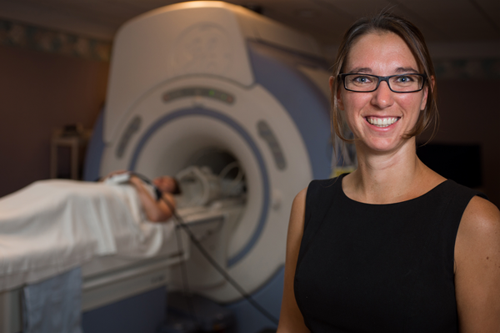Date:
Location:
 Phillips’s talk, “New Frontiers in Neurohumanities: An fMRI Study of Literary Attention and Jane Austen,” discusses new work in cognitive approaches to literature, the neuroscience of narrative and the history of mind. Its focus is on a unique cross-disciplinary experiment that teamed scholars in the humanities, radiology, and neuroscience to explore the evolving neural networks involved in attention and reading in the brain. The study used tools from neuroscience, such as functional magnetic resonance imaging (fMRI) and eye tracking, to explore the cognitive dynamics involved in reading a literary work with different levels of attention. Using fMRI, her team analyzed complex changes in brain activity as doctoral students in literature read a chapter of Mansfield Park with two styles of attention: close reading (or, literary analysis) and pleasure reading. The study’s surprising early results suggest that such re-focusing in reading is far from subtle. Scans demonstrate dramatic and unexpected increases in blood flow to regions of the brain far beyond those responsible for “executive functions,” suggesting that how we read may be as important as what we read. Linking this fMRI study of attention and Phillips’s research on the literary history of distraction, the work suggests that research crossing the supposedly “unbridgeable divide” between humanities and sciences is in fact central to advancing our understanding of mind and brain. Phillips also proposes that understanding attention’s history is crucial, arguing that a series of key debates over focus that continue to shape modern neuroscientific studies have roots that can be traced back to the Enlightenment. Finally, and most importantly, she suggests that advancing narrative neuroscience will involve a still-closer alliance among literary scholars, creative writers, artists, and scientists, working to provide a real-time view of the brain as we engage with complex works of literature, music, or art.
Phillips’s talk, “New Frontiers in Neurohumanities: An fMRI Study of Literary Attention and Jane Austen,” discusses new work in cognitive approaches to literature, the neuroscience of narrative and the history of mind. Its focus is on a unique cross-disciplinary experiment that teamed scholars in the humanities, radiology, and neuroscience to explore the evolving neural networks involved in attention and reading in the brain. The study used tools from neuroscience, such as functional magnetic resonance imaging (fMRI) and eye tracking, to explore the cognitive dynamics involved in reading a literary work with different levels of attention. Using fMRI, her team analyzed complex changes in brain activity as doctoral students in literature read a chapter of Mansfield Park with two styles of attention: close reading (or, literary analysis) and pleasure reading. The study’s surprising early results suggest that such re-focusing in reading is far from subtle. Scans demonstrate dramatic and unexpected increases in blood flow to regions of the brain far beyond those responsible for “executive functions,” suggesting that how we read may be as important as what we read. Linking this fMRI study of attention and Phillips’s research on the literary history of distraction, the work suggests that research crossing the supposedly “unbridgeable divide” between humanities and sciences is in fact central to advancing our understanding of mind and brain. Phillips also proposes that understanding attention’s history is crucial, arguing that a series of key debates over focus that continue to shape modern neuroscientific studies have roots that can be traced back to the Enlightenment. Finally, and most importantly, she suggests that advancing narrative neuroscience will involve a still-closer alliance among literary scholars, creative writers, artists, and scientists, working to provide a real-time view of the brain as we engage with complex works of literature, music, or art.
Presenter(s):
Natalie Phillips, Ph.D.

An Assistant Professor of English at Michigan State University, Phillips specializes in 18th-century literature, the history of mind, and cognitive approaches to narrative. Her first book project, Distraction: Problems of Attention in Eighteenth-Century Literature (in progress) traces how changing Enlightenment ideas about the unfocused mind reshaped literary form, arguing that descriptions of distraction in narrative advanced--and often complicated--scientific theories of concentration. She is also a leading figure in the emerging field of literary neuroscience, pioneering a series of interdisciplinary experiments that use neuroscientific tools, such as fMRI and eye tracking, to explore the cognitive dynamics of literary reading. She is co-founder of the Digital Humanities and Literary Cognition Lab in the Department of English at MSU, and Lead Faculty for Literary Neuroscience and History of Mind. In addition, she is a collaborating scientist with Stanford University, Lund University, and Umea for a research initiative, “Culture, Brain, and Learning,” supported by the Wallenberg Foundation of Sweden. Current experiments include an fMRI of literary attention (Neuroventures), an eye-tracking study of digital media (Wallenberg Foundation), and a project-in-progress on narrative empathy and stories of trauma. This work has grown into her second book project, tentatively entitled “Literary Neuroscience and the Aesthetics of the Brain, 1700-2012,” which theorizes a more reciprocal relationship between literature and neuroscience in interdisciplinary experiments and historicizes literary renderings of the brain from the eighteenth century to the present.
Phillips' research has been supported by the American Council for Learned Societies, the Mellon Foundation, the Wallenberg Foundation, the TEAGLE Foundation, the Stanford Center for Neurobiological Imaging, the Stanford Humanities Center, the MSU College of Arts and Letters, and the Royal Bibliographic Society. Her work on Jane Austen and the history of attention has appeared in Theory of Mind and Literature and the Princeton Encyclopedia of Poetry and Poetics, and new essays in literary neuroscience and the history of mind are forthcoming in the Oxford Handbook for Cognitive Approaches to Literature (Oxford, 2013); Eighteenth-Century Poetry and the Rise of the Novel (Bucknell, 2013); and Humanities and the Digital (MIT Press, 2013).

